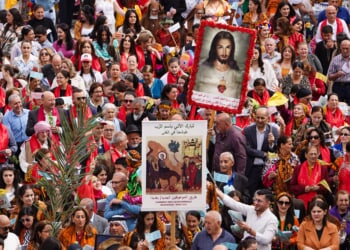Christ has been painted and sculpted by the greatest artists in the world, each in their own way, guided by their talent and their era. And there’s one thing that seems common to all: the merciful and sorrowful eyes, those expressing the pain of being slowly emptied, nailed to a solitary piece of wood. They are the eyes of the cross. And they are universal. You know them, and perhaps you yourself have them.
They found in Golgotha what today is a source of exaltation for Christians: meaning, strength, life.
The cross of this Good Friday and its infinite meaning, which marches through the streets of Spain as I write this, is the greatest allegory of humanity, because in life, there are no roses without thorns. Christianity has brought an extraordinary sense of humor to life’s bitterness, masterfully represented in the fact that the cross is the symbol of the religion of love. But only those who stop seeing the cross and start seeing the one crucified can understand this. The cross, like a piece of wood nailed to the ground, lacks reasons or answers. But the one condemned holds them all.
Christianity is a vast Chestertonian paradox, perhaps because life itself is also. An all-powerful God who becomes a vulnerable man. God, immense and almighty, turned into a tiny baby in a humble manger. A Savior who performs miracles and is punished for it. A man who preaches love and is murdered out of hate. A God who dies so that we may have eternal life. The worst of sins gives way to the greatest grace and mercy. The cross of pain and loneliness is now the symbol of love and brotherhood.
Jesus was the greatest misunderstood figure in human history. That’s why, for the inconsolable ones throughout time —who are legion — Christianity shows the path to solace: Golgotha, the “place of the skull.” Admittedly, it doesn’t sound like much fun. Many still expect to find salvation in some nightclub. But appearances can be deceiving. That was the mount of Christ’s crucifixion in Jerusalem. And the most significant skull in this grim place was, in the end, His own. Thanks to it, Golgotha is not the peak of salvation for the disinherited, but for the hopeful. Jesus conquered death after the cross. And only after the cross. But He conquered it. That’s why Christians always live halfway between celebration and mourning, between pain and hope, between sorrow and joy.
Christ’s Glory and Suffering
The rites of Holy Week emphasize these contrasts. We see it especially in the liturgy of the Easter Vigil. Darkness overcome by light. Fasting and suffering to attain happiness. Passing through this valley of tears to reach eternal salvation. From “Sorrowful Mother” to “Gloria in excelsis Deo.”
Some paint Jesus’ life with so many bright colors and beautiful embellishments that they forget He was tortured and crucified with the same brutality shown by jihadists today, only with the slight difference of twenty centuries of supposed civilization. He died precisely to explain — with permission of my theologians — that the coveted “well-being” doesn’t exist. The thing is, humans make brilliant plans that always go awry. We’re good at building Titanics. Meanwhile, God is better at parting waters, which is far less problematic than launching a peanut-shaped monument into the vast ocean, hoping it won’t be swallowed by the sea.
This alone explains the serenity with which the innocent — those who have been shedding blood since the dawn of time — are still gunned down or beheaded, whether in the Congo or the Middle East. They found in Golgotha what today is a source of exaltation for Christians: meaning, strength, life. When you encounter them, the exiled, don’t avoid their gaze. Never forget the eyes of the cross when you see the cross in someone’s eyes.
And during these Holy Week days, we shouldn’t forget that paradox always comes to the rescue in a Christian’s despair. Just as day follows night, Christ’s death and the desolate silence of God’s absence in tabernacles worldwide on Holy Saturday are followed by the wild joy of the Resurrection, the immense light, salvation, songs of praise, and toasts of joy, a happy ending straight out of Hollywood’s golden age.
Happy Easter to all my dear readers.
READ MORE from Itxu Diaz:


![NYC Tourist Helicopter Falls into Hudson River, Siemens Executive and Family Among Those Killed [WATCH]](https://www.right2024.com/wp-content/uploads/2025/04/NYC-Tourist-Helicopter-Falls-into-Hudson-River-Siemens-Executive-and-350x250.jpg)






![Green Day’s Cringe Trump Diss Ends in Fire and Evacuation [WATCH]](https://www.right2024.com/wp-content/uploads/2025/04/Green-Days-Cringe-Trump-Diss-Ends-in-Fire-and-Evacuation-350x250.jpg)
![Red Sox Fan Makes the ‘Catch of the Day’ with Unconventional ‘Glove’ [WATCH]](https://www.right2024.com/wp-content/uploads/2025/04/Red-Sox-Fan-Makes-the-‘Catch-of-the-Day-with-350x250.jpg)






